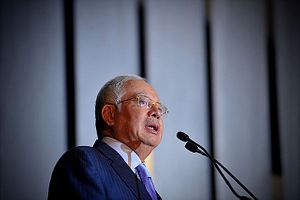This week, Shabudin Yahaya, a member of Malaysia’s ruling Barisan Nasional coalition, sparked outrage when he appeared to suggest in Parliament there was nothing wrong with a rape victim marrying her rapist because her future would not be so bleak.
“They reach puberty at the age of nine or 12. And at that time, their body is already akin to them being 18 years old. So physically and spiritually, it is not a barrier for the girl to marry,” Shabudin said during a debate on the bill.
His comments sparked an outrage on social media. Shabudin later complained his comments were taken out of context, adding he was not saying that marriage was the “back door exit to legalize rape,” and threatened to take legal action against the media, which he said had manipulated his remarks. Shabudin also predictably said his decision to reject a motion banning child marriages was made because it was contrary to the provisions in sharia law.
Irrespective of what Shabudin actually said and meant, to some, his comments fit into a broader trend in Malaysia where politicians increasingly hide behind the Quran to justify their erosion of democracy and basic decency.
Malaysia, a Muslim-majority country which constitutionally guarantees the protection of religious freedoms of other sizable minorities, has increasingly seen its image as a moderate, tolerant, and secular society tainted. Hardline Islamists have challenged this ideal through the courts, bureaucracy, government, and even in the streets in an attempt to impose their own brand of sharia law on the rest of the country.
Concerns have been mounting over the years, with sporadic incidents including the firebombing of churches, a ban on non-Muslims using the word Allah, and the occasional banning of rock concerts and entertainment acts considered too risqué for hardline Muslim groups. But arguably more worrying than these individual incidents has been the fact that the government of Prime Minister Najib Razak has far too often not stood up to – and has at times even acquiesced to – this growing intolerance in its bid to secure votes.
To be fair, with respect to child sexual abuse in particular, there is some good news in Malaysia. For instance, a special court will be set up to deal with child sexual abuse cases, which is an enormous step forward given past and present attitudes.
People possessing or distributing child pornography involving those under the age of 18 could face up to 30 years in jail and six strokes of the whip. That might help improve Malaysia’s poor record in prosecutions. Just 140 cases out of 12,987 reports of child sexual abuse between 2012 and July 2016 resulted in convictions.
Reports last year claimed rapists were offering to marry victims as young as 14 years of age and some rapists were also offering financial compensation to the families of their victims. Their primary motivation was to escape prosecution.
But the forecast for tolerance in Malaysia more broadly is far from sunny. Malaysian unity is being ferociously tested, with elections scheduled by next year and Najib remaining unpopular after a string of scandals and demands for his resignation. He has refused to quit, but many Malaysians are asking whether the price of his tightening grip on power may be too high for the country to bear.
That is true with respect to Najib’s ability to withstand the threat posed by hardline Islamists, as opposed to giving in to it and undermining the social fabric that holds the diverse country together. It is this structural problem that keeps turning the remarks of a few like Shabudin into a national controversy and into a series of “tests” for Najib and the country. And until the basic dynamic is addressed, this is likely to continue.
Luke Hunt can be followed on Twitter @lukeanthonyhunt













